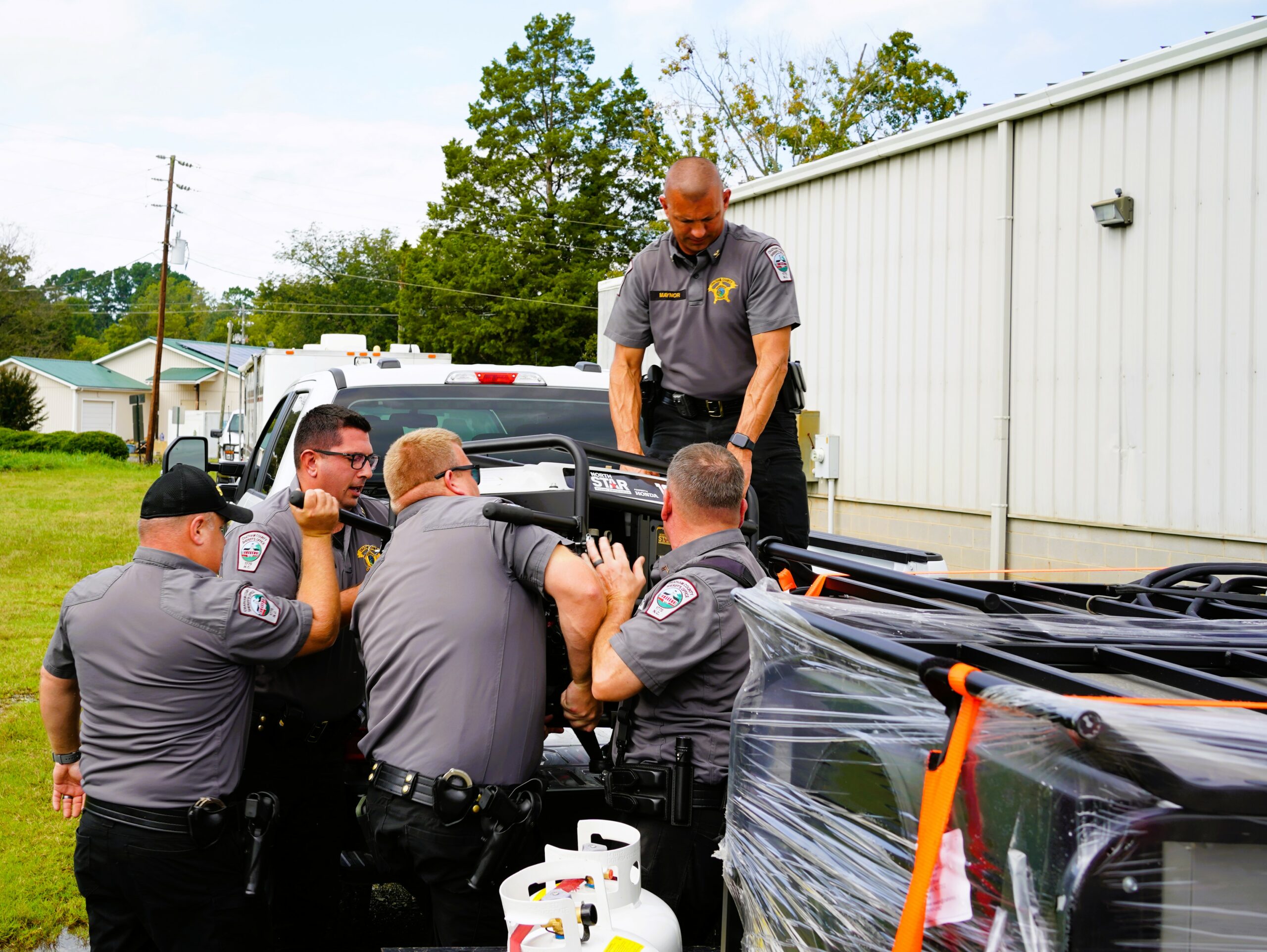As the President of the North Carolina Sheriffs’ Association, Chatham County Sheriff Mike Roberson knows when disaster strikes in North Carolina, it’s his responsibility to check in with the local sheriffs. This weekend, as Hurricane Helene ripped through the western part of the state, he called some of his colleagues to go visit their peers in the affected counties where cell service is down.
“We sent a couple of sheriffs to different places that we thought were pretty bad,” Roberson told 97.9 The Hill on Tuesday, “large, populated areas – to make sure that if we sent [people or things] out, they’d be able to take the help we were sending them.”
Roberson called up former NCSA president and Orange County Sheriff Charles Blackwood to accompany him to Henderson County. Blackwood said it didn’t take long on the trip out to western counties to begin seeing the signs of devastation and the extent to which first responders were stretched thin.
“When I rode by a farm tractor company and saw mud on the roof of that building, and every unit on the front of the building covered in mud,” Blackwood said on Monday, “I knew this was not the normal type of disaster we respond to. When I saw the look [on the sheriff’s] face of just complete despair, my heart went out to him and, immediately, I thought about what I would [feel] if Chapel Hill and Carrboro were under nine feet of water.”
When the pair asked Henderson County Sheriff Lowell Griffin what he needed in the short term, Griffin candidly responded that he wasn’t sure because of how extensive the need was. His office runs its 911 dispatch operations, which were limited between the lack of service, access, and their backup site being counties away. The result, Blackwood said, was first responders being absolutely worn out from leading an undermanned response for close to 24 hours.
“They had deputies who were responding to residents’ houses and actually removing residents who had drowned within their homes,” the Orange County sheriff recalled. “We had telecommunicators in his office from their 911 center telling us stories [like], ‘We’re listening to people take their last breaths, only able to tell them that nobody is coming because we can’t get to them.’
“The devastation and anguish in those deputies’ and telecommunicators’ voices and hearts,” Blackwood added, “are much like those who have been at war.”

A Madison County sheriff’s vehicle passes damaged buildings along Bridge Street in the aftermath of Hurricane Helene Tuesday, Oct. 1, 2024, in Hot Springs, N.C. (Photo via AP Photo/Jeff Roberson.)
Roberson said it was later that day better communication got established between law enforcement and emergency responders, which then helped the resources begin to flow into the region on Monday. And while it also allows more rescues to be made, navigating remote areas is still difficult because of how the floodwaters demolished or covered roads.
“Anywhere that has a bridge, even across a driveway, is gone,” said Roberson. “So, people are isolated and even emergency services can’t get to the people who are asking for help. As we’ve gotten communications going, we’ll know better about how deep of an issue it really is.”
Ultimately, Roberson activated both the Sheriffs Helping Sheriffs program and the Statewide Disaster Assistance Network to help counties like Henderson. Through the North Carolina Sheriffs’ Association, the dual efforts are meant to ensure local law enforcement have the right equipment, materials and manpower in the right places.
“We get sheriffs calling in needing resources, and we try to match the available resources,” Roberson said of the Sheriffs Helping Sheriffs initiative. “Sometimes all help’s not good help – and sending the wrong thing to the wrong place… it’s a little more difficult than you may think. A lot of people want to help, but we want to send the right people to the right places.
“I know there’s [more than] 300 deputies already deployed,” he added of the response to Helene, “more than 30 agencies have sent [personnel] to them – like detention officers, deputies, telecommunicators. There’s been a lot of outpouring and lot of help coming from all over the state.”

A group of Chatham County Sheriff’s Office staff work to get supplies loaded up before deploying to western North Carolina on Monday, Sept. 30. (Photo via the Chatham County Sheriff’s Office.)
While there’s much attention around western North Carolina now, both Roberson and Blackwood said it is likely to take weeks and months of coordination to help communities start their road to recovery from Hurricane Helene.
“This is going to take an all-hands-on-deck and a whole of government approach – state, federal and local authorities working together, hand-in-hand,” said Blackwood. “And if we do that and remember why we’re here, we’ll get to where we need to be.”
That long-term commitment to helping disaster victims includes fundraising and donations from communities like Orange and Chatham counties. Roberson said he’s been “overwhelmed” with people looking for ways to help. But both sheriffs cautioned against people traveling to western North Carolina with their own supplies, saying they should instead let the state and national organizations coordinate with local responders.
“If you don’t have a point to drop [supplies] off,” said Roberson, “please don’t go out there with trailers of stuff and just stop on the side of the road. It creates expectations of things are inadequate or inequitable, and we just want you to make sure you worth through some of the organizations that are dealing with [the disaster relief] now.”
The Chatham County Sheriff also urged people to donate to reputable organizations, including both of their offices’ drives, because of the higher certainty supplies will be delivered to those in need. Both Roberson and Blackwood maintained the best donation for now is money, calling it the most efficient resource because it doesn’t cost anything to transport and can be used for a variety of relief and recovery efforts in western North Carolina.
To find a list of local donation drives, click here. Links to the local sheriff’s offices’ drives can be found here.
Chapelboro.com does not charge subscription fees, and you can directly support our efforts in local journalism here. Want more of what you see on Chapelboro? Let us bring free local news and community information to you by signing up for our newsletter.










